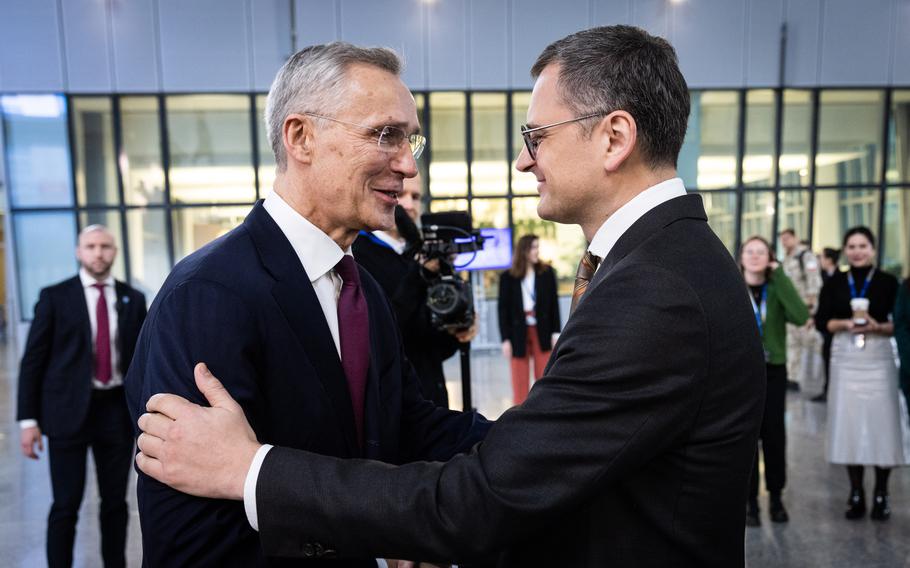
NATO Secretary-General Jens Stoltenberg meets with Ukrainian Foreign Minister Dmytro Kuleba at the organization's headquarters in Brussels, April 4, 2024. Kuleba said that Ukraine urgently needs more air defense systems, including American-made Patriot interceptors. (NATO)
Ukraine’s foreign minister warned Thursday that without more support his country was at risk of destruction, putting a damper on an otherwise festive mood at NATO headquarters as members marked the alliance’s 75th anniversary.
Dmytro Kuleba, in Brussels to meet with top allied officials, said Ukraine urgently needs more air defense systems, including American-made Patriot interceptors.
“I came here against the background of continued, unprecedented missile and drone attacks of Russia against Ukraine … which fits the Russian strategy to eliminate Ukraine from the map,” Kuleba said.
The comments from Ukraine’s top diplomat coincided with the anniversary of NATO’s founding on April 4, 1949. At the alliance’s headquarters Thursday, foreign ministers and NATO commanders gathered for a wreath-laying ceremony.
NATO Secretary-General Jens Stoltenberg marked the moment, saying allies were “more united than ever” and that Russia’s attacks on Ukraine, both in 2014 and 2022, have galvanized the alliance.
“Since then, we have undertaken the biggest reinforcement of our collective defense in generations,” he said.
Moments later, Kuleba, flanked by Stoltenberg, congratulated the alliance before turning to events in Ukraine and the need for Patriot missiles.
“I don’t want to spoil the party,” Kuleba said. “My main message today will be Patriots, because saving Ukrainian lives, saving Ukrainian economy, saving Ukrainian cities depends on the availability of Patriots and other air defense systems.”

NATO celebrated its 75th anniversary with a ceremony at its headquarters building in Brussels, April 4, 2024, during the second day of a two-day foreign ministers' meeting. (NATO)
In March, Ukraine was hit with 94 Russian ballistic missiles, he said. The Patriot is the only system able to intercept such weapons, he added. On top of that, Russia has deployed other missiles and carried out thousands of drone strikes in recent days, Kuleba said.
Kuleba’s visit to NATO comes as the alliance is looking for a more reliable system for getting arms into Ukraine. On Wednesday, allies agreed to move forward with a proposal that calls for making NATO the planning hub for arming Ukraine.
If put into action, it likely would overtake the U.S.-led Ukraine Defense Contract Group, also known as the Ramstein Group because of its meetings at the U.S. Air Force hub in Germany.
It’s not clear whether the U.S. is on board with the idea. White House spokesman John Kirby on Wednesday said the group, led by Defense Secretary Lloyd Austin, has been effective in bringing together more than 50 countries.
“We’re going to continue to lead and convene it. And we know that our leadership of that contact group is valued, it’s important,” he said.
The alliance also is considering a new $100 billion fund over five years to better support Ukraine.
The ideas are part of an effort to add more predictability to an aid program that has run into political opposition in parts of the alliance, most notably in the United States. In Washington, partisan political disputes over how to support Ukraine stand in the way of a budget deal to deliver more arms.
The political impasse in the U.S. has led to a reduction in the flow of arms and has forced Ukraine to ration artillery.
Stoltenberg on Thursday said allies continue to work on “a more robust and predictable framework,” to support Ukraine.
“This matters for Ukraine, but it matters also for the whole of NATO, for our security,” Stoltenberg said.